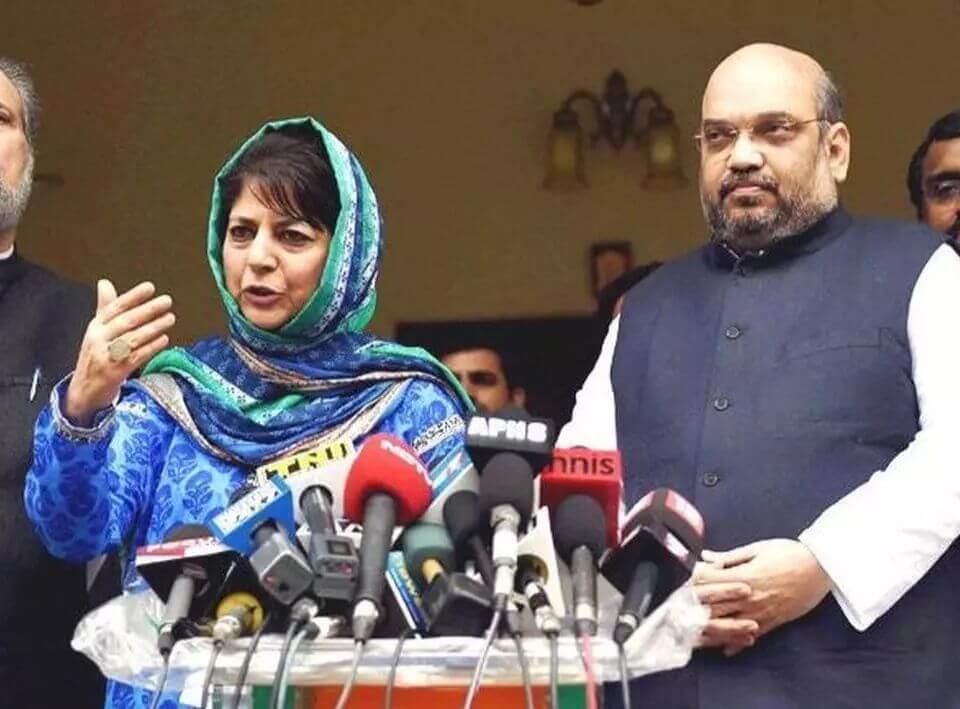BJP-PDP alliance breaks. As unexpected as the decision of coming together of BJP (Bhartiya Janata Party) and PDP (People’s Democratic Party) as an alliance was back then, their breakup was also not expected at all. Last week, BJP withdrew its support from PDP in the state of Jammu and Kashmir which was followed by governor’s rule in the state, as well as meaning the end of the alliance after 3 years. Several reasons have been put forward and have been speculated since then.
BJP has put forward the issue that no changes have been brought in the state so far. Terrorism is still an active part of the state, the youth are still unsatisfied with the frequent attacks by throwing stones. The recent issue of lack of security to the soldiers in the state, in the case of Aurangzeb, has also been speculated to be one of the reasons why BJP withdrew its support from the alliance. PDP believes that it was a shock for them as no meetings were held on these issues and no steps were taken for them to expect this breakup.
WAS THERE A DIFFERENCE OF OPINION BETWEEN PDP AND BJP ON ENDING THE UNILATERAL CEASEFIRE?
PDP has always been in favour of the ceasefire. The election manifesto had this agenda and has still been a part of their actions. Mehbooba Mufti always believed that talks could resolve the issue. PDP believes that it has not ruined the state and instead have undertaken a lot of developmental activities. Despite some security apprehensions, both the parties were working smoothly.
Read more – All You Need To Know About Instrument Of Accession Of Kashmir
Also when the decision was taken to talk to the separatists, the chief minister did not solely take the decision. It was only after the talks with the Prime Minister and Union Home ministry, that the talks took place.
However, all this then makes us wonder the real reasons why BJP withdrew its support from the alliance. All these problems were always a part of the state and had not been addressed before. Is it then a strategy of BJP for the 2019 elections?
PDP believes it was a show of political one-upmanship by BJP. They didn’t present their grievances in front of the chief minister. BJP had some other compulsions. It could be seen as a political stunt. BJP claims that the militancy has risen in the state, and PDP was not successful in addressing the issue, however, it was always the condition, so why did BJP decided to withdraw only when 2019 elections were near?
Governor’s rule should be the last option to choose in any democracy. Its imposition in a state like Jammu and Kashmir, which already has several problems within, makes us wonder several things. It has been debated that the BJP wanted to have complete muscular power over the state and could be answerable to the people in 2019 elections and garner the support of the people.
The people were never happy with coming together of PDP and BJP, given that they had huge ideological differences. They had grievances and the stone pelters came out to the streets due to some insensitive statements exchanged between the coalition partners. However, Mehbooba Mufti believed it to be a step for the benefit of the state in the long run.
HOW WILL THE IMPOSITION OF GOVERNOR’S RULE CHANGE THE SITUATION OF JAMMU AND KASHMIR?
Governor’s rule is imposed for a period of six months under the provision of section 92 of the state constitution in the case of Jammu and Kashmir only after the consent of the president. Immediately after the breakup of the alliance, president Ram Nath Kovind agreed to impose governor’s rule in the state. Governor NN Vohra has now been assigned the role of a chief administrator in the state. Vohra has been in the same role four times before as well. In July 2008- January 2009, PDP had withdrawn from the Azad government and NN Vohra had taken a role in this governor’s rule. Similarly, in 2015, this situation had taken place.
Read more – What Is The Kashmir Issue And How It Started?
This situation worsens the condition of the state where its state assembly is suspended. It makes matters worse for the people as terror increases and the democratic system is suspended for a while. Already with harsh conditions like these, centre tends to play the highest role in decision making of the state and the state’s issues are kept aside. Therefore, this imposition of governor’s rule has seen as a masterstroke of the BJP at the time of upcoming elections.
By this example, we can see that the parties who come together which are completely ideologically different from one another, just for the sake of gaining power, don’t usually have a happy ending. In this case, as well PDP and BJP had different views on improving the conditions of Kashmir but came together, for the attainment of power. Therefore this case as well didn’t have a happy ending and resulted in governor’s rule.
